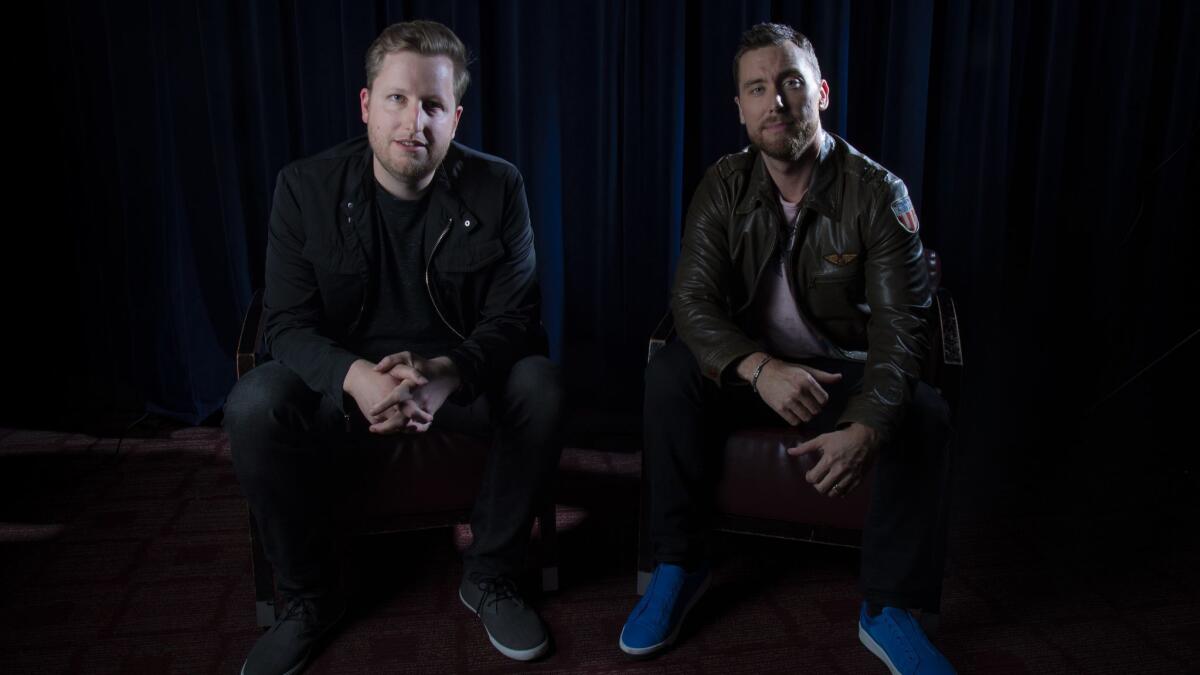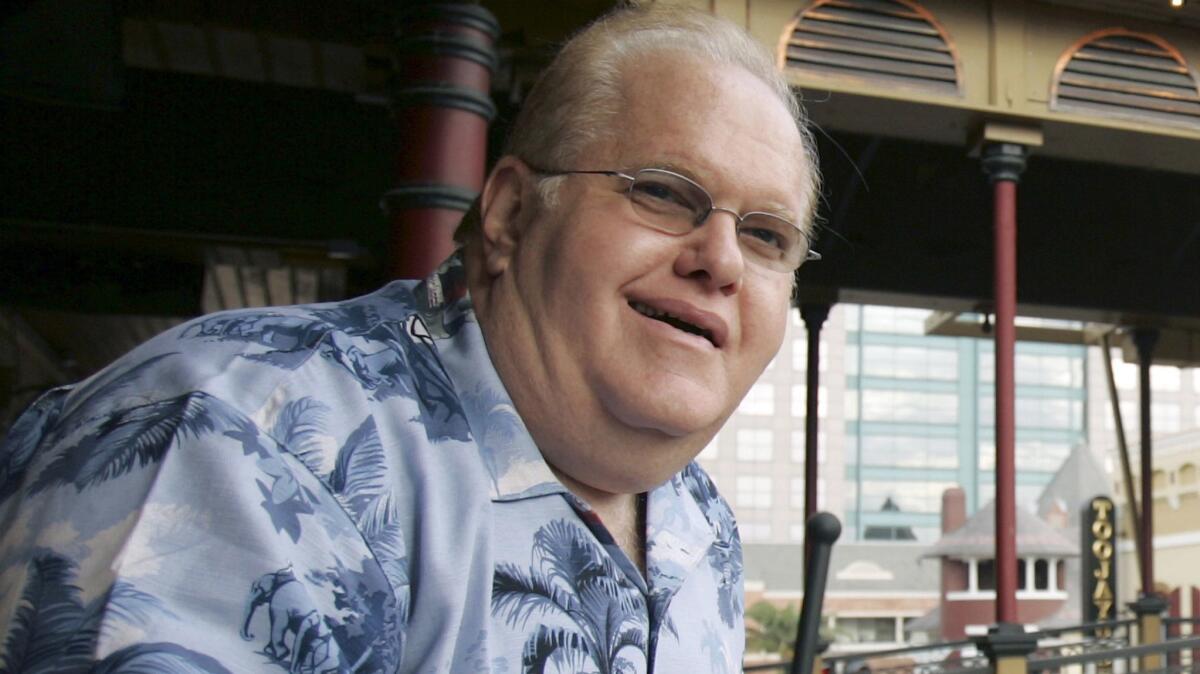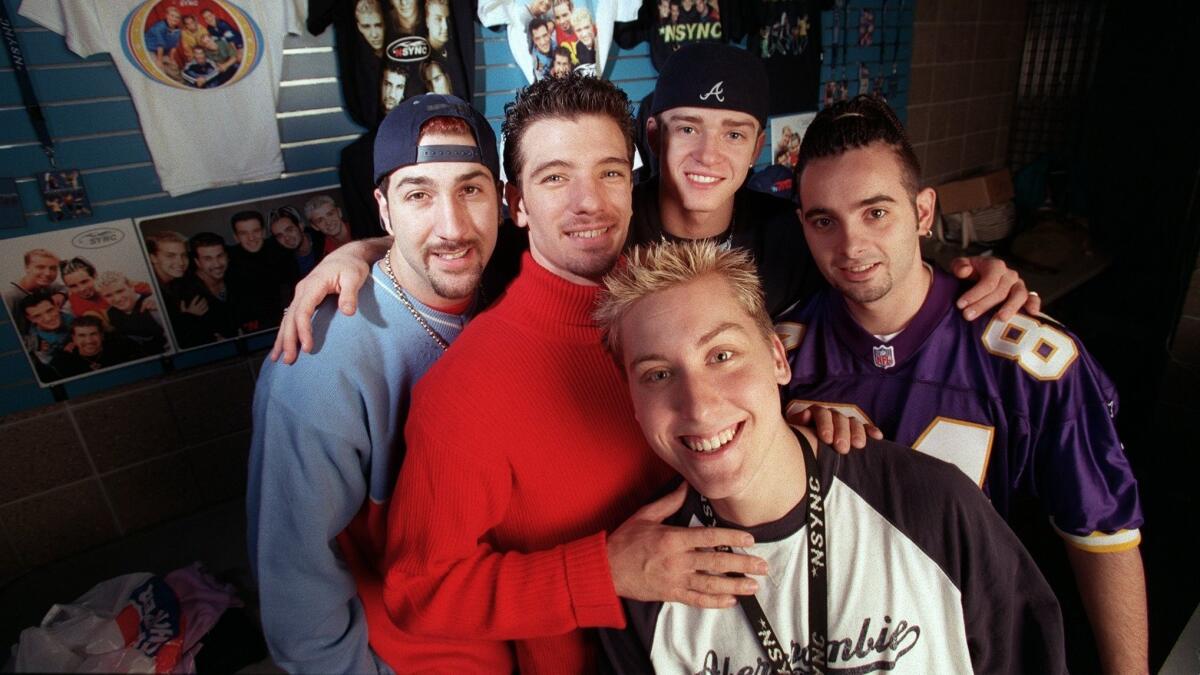’N Sync’s Lance Bass trains a lens on Lou Pearlman, the con man who made him a star
- Share via
’N Sync had been together three years before its members were presented their first paychecks.
Lance Bass, one of the five members of the boy band, didn’t know how much to expect, exactly — up till then, they’d been getting only a minimal per diem — but he was certainly anticipating a decent sum of money. After all, by this point in the late ’90s, the pop group had sold more than 10 million records and performed for screaming girls in arenas across the globe as T-shirts and posters flew off the racks.
When Bass saw the number, he was stunned: $10,000. Far less than he would have made working a minimum-wage job.
It was there, sitting at a would-be celebratory dinner at Lawry’s, that he realized he and his bandmates had been swindled by Lou Pearlman — the Florida businessman who’d created both ’N Sync and their rivals, the Backstreet Boys.
Some time later, the pop stars would discover that Pearlman had scammed them through a shady contract — legally naming himself as a band member (and therefore diluting their incomes) and charging the guys for hotel stays, travel and fancy meals they didn’t realize they were responsible for.
They weren’t the only ones who’d been bilked out of millions. A decade later, in 2008, Pearlman would plead guilty to running one of the biggest Ponzi schemes in U.S. history, persuading investors and banks to put more than $300 million into his two fictitious travel businesses. He even funneled the money he made from the music groups into his scheme, creating fake pay stubs to convince investors he had a fleet of airplanes. He was sentenced to 25 years in prison, where he would die at age 62 in 2016.
With the distance to reflect on his relationship with the con man, Bass has now produced a documentary about the late criminal, “The Boy Band Con: The Lou Pearlman Story.” The film, which premiered to strong reviews at the South by Southwest Film Festival in Austin, Texas, last month and opened in limited theatrical engagements last week, will debut Wednesday on YouTube.
Bass, now 39, has been quietly dipping his toe into the nonfiction space for the last few years, producing documentaries about gay civil rights in his home state of Mississippi and a Christian conversion therapy school in the Dominican Republic. For his latest project, he teamed with director Aaron Kunkel of Pilgrim Media and used his clout to persuade members of ’N Sync, the Backstreet Boys and O-Town to sit for interviews.

Lance, how was this film initially pitched to you?
Lance Bass: Aaron said he wanted to do the Lou Pearlman story, and my first reaction was like, “OK. I will totally do this, but it has to be the correct tone.” Because so far, anything that’s ever been told about Lou was the salacious, sex, drugs and rock ’n’ roll type stories — the Vanity Fair [article], the “American Greed” [episode]. I wanted to tell a more in-depth story.
Aaron Kunkel: We always pitched it as more of an investigative documentary. It was important to have Lance involved to make sure we were doing things the right way and, honestly, for casting. The reason a lot of the people in the story haven’t been involved up to this point is because nobody trusted that the story was going to be told the right way. So having Lance on board helped to build that trust. He could just talk to them and be like, “No, we’re going to do this the right way and tell the real story,” and that really helped.
Bass: There were still people who were nervous. One, they just don’t want to go down that road again. He hurt a lot of people — especially the Ponzi scheme victims who lost everything. It’s hard to crack that open again and feel those feelings. And some people are really just kind of scared for their lives, still. There’s a lot of weird things that people are afraid to tell the full story of, because they don’t know who else is out there that might hurt them. There were even some people in the film that asked for certain things to be taken out, and we obliged them, because they were scared of certain things they said.
Kunkel: We didn’t take anything out that we were worried was going to make anybody look bad — it wasn’t that kind of thing. It was like, “Actually, if you include this, I feel really uncomfortable about safety.”
Lance, do you remember, initially, being weirded out by the fact that this middle-age businessman with no background in the music industry wanted to start boy bands?
Bass: No. I would have taken any shot. The way he explained it to us was — and it sounded very legit and reasonable — he wanted to start this record label because he flew the New Kids on the Block on one of his planes and saw they were a billion-dollar business. And as a greedy businessman, he was like, “I’m gonna make money off these kids.”
Kunkel: We also couldn’t even prove he flew New Kids. That’s the story, but we asked everyone and they were like, “Yeah, we think so.” But he didn’t actually own any planes. He could have flown them on a charter plane he leased out.

How much were you interacting with Pearlman during the early days of ’N Sync?
Bass: The first couple years of our career, he never really saw us too much on the road. We were just with Justin’s mom and my mom. We got no support from the label, because we were the red-headed stepchild that no one wanted. So we were just kind of left on our own. The first year that we lived in Orlando, we’d see him all the time, because we lived in the same town and he was always over at the house and watching rehearsals. Then after we started touring over in Europe, we rarely saw him.
And how did you decide which musicians to ask to participate in the film?
Bass: If I could have gotten everyone from every group, I would have. But my goal was just to get two. I had no idea I would get three ‘N Sync guys. [Bass, JC Chasez and Chris Kirkpatrick.] Joey [Fatone] said no, but wanted to do it after he saw the first cut. I didn’t ask Justin [Timberlake]. I just figured he wouldn’t want to do it. I just assumed his people wouldn’t want to do it because, again, you just don’t know the tone. You could trust me, but do you trust Pilgrim and YouTube? Like, “Why’d you edit it this way?” I didn’t even want to go down that route. And I really wanted to get one more Backstreet Boy, especially Brian [Littrell] or Kevin [Richardson], but it’s still such a hurtful thing to them that they just don’t want to rehash it. [AJ McLean is the sole Backstreet Boy in the film.]
Aaron Carter is the only person in the documentary who comes to Lou’s defense, and he gets emotional — crying as he says that none of you would have had careers were it not for Lou. What do you make of that point?
Kunkel: Whether or not [Pearlman] was the talent that put the bands together, he was at least the kickoff point that put all the bands together. He pretty famously put $3 million into Backstreet in their first couple of years, and I’m sure a pretty equal amount into [’N Sync]. You can’t take that away. It wouldn’t have happened without that. A lot of making this was trying to reconcile that with how you view him.
And we were really happy that Aaron brought a voice of dissent. We never wanted to make this as a one-dimensional hit-piece. Aaron, I think, speaks to the fact that so many of them viewed Lou like a father figure. He started working with Lou when he was, like, 7. When you have someone who is ... helping you become this big pop star, I think there’s a lot of positive energy that comes from that. I think he’s speaking from a place from wanting to defend somebody that genuinely got him where he was.
Bass: He had no one. Aaron’s parents were horrible parents. This was his dad figure. You can see the torture in his face still.
REVIEW: The dark underbelly of a ’90s craze exposed in ‘The Boy Band Con: The Lou Pearlman Story’ »
Even after you and the Backstreet Boys had severed ties with Pearlman, he created O-Town through the 2000 ABC reality show “Making the Band.” Were you shocked that so many starry-eyed hopefuls were still willing to trust him at that point?
Bass: I actually talked to those boys before they even signed their contract. I sat them down in New York, because one of my best friends from high school was in the original O-Town — Paul Martin. I kind of sat with the guys and explained everything: “We are going through this horrible time, he’s a crook.” And they still signed with him. I understood. Especially when you saw how big we were at the time and you’re promising them the world... It’s either “do I go back to high school, or do I go be a part of this TV show that’s on ABC and immediately be overnight sensations because now we’re with the biggest music producer in the world?”
In the film, former O-Town member Ashley Parker Angel says Pearlman was touchy-feely with him and insinuates that he dodged being sexually assaulted by him. There have long been rumors about Pearlman and young men — how did you handle those allegations?
Kunkel: We didn’t want to engage in any rumor-mongering or anything like that, so we tried to be as meticulous as possible and have corroboration for anything that was said. But we’re really happy we were able to provide a platform for everybody to just speak. That’s what we wanted everyone to do, because ultimately, a lot of people had a lot of weird feelings about things that Lou did.
You also include a clip of the late LFO member Rich Cronin on “The Howard Stern Show” in which the musician alleges Pearlman requested Cronin touch his penis and the genitals of a European music executive.
Bass: There are lots of stories like the Rich Cronin thing that I personally know happened to other people that wouldn’t want to tell the story. It’s frustrating knowing that you’ve confirmed some things but there’s no way you could put it in your film without someone corroborating it. If I had no soul, I would easily repeat the stories I heard from certain people, but I have a soul.
Did you ever feel like Pearlman took a personal interest in young men?
Bass: I always felt that. Oh, yeah. Even at 16. Especially when he’d be like, “Hey boys, boys, I was a physical therapist in my past life and I can manipulate your muscles so it looks like you worked out right before a photo shoot.” He’d always be manipulating your muscles to make them look bigger. You’d be like, “He just wants to touch us.” You never talk about it, you just knew something was up. To me, of course, I was a young kid, it felt innocent to me. It never felt like abuse.

There are a lot of documentaries circulating right now that explore how powerful individuals like Larry Nassar and Michael Jackson have exploited their status for evil. What do you think we can learn from these stories?
Bass: We trust people in power too easily. You think, “Someone that big, obviously it’s not a scam, because then people would know and they can’t just be that blatant about it.” But they are. People like Lou Pearlman, they’re just so blatant about it and double and triple down on their abuse that you start to believe everything they say.
Kunkel: I think it’s great that these kind of stories are being told, because I think people need to be on guard that this kind of stuff happens. It’s really hard to suss out what you need to be looking for. One of the things that it was great to watch, especially with Lance and his mom, is how important it is to have a good support group around you. Even if these things do happen, they’ll have your back and be there to support you and make sure you’re OK and all of that. It’s hard. Hopefully, people will stop looking the other way when people in power are doing this kind of thing. Hopefully, there’s more of a reckoning.
Lance, you worked with choreographer Wade Robson when you were in ’N Sync — have you watched “Leaving Neverland,” in which he alleges he was sexually molested by Jackson?
Bass: I have not seen it yet. I’ve been waiting to watch it until this is all done, because I know it’s going to be very disturbing for me to watch. I haven’t seen Wade since, like, 2002.
Do you ever get mad thinking about all the money you lost due to Pearlman?
Bass: Of course, in hindsight, I’m like, [crap]. But I’m very lucky that we got a great career out of it and I was able to pivot and do what I’m doing now, and a lot of people weren’t that lucky. I count my blessings, and I look at it as a life lesson. I learned it early. “Great, no one is gonna take advantage of me like that again.” But yeah, I wish I would have had a lot more. [laughs]
I’m totally in a place in my life where I’ve forgiven everything from the past and Lou. I have no ill feelings whatsoever. That is off my shoulders. This doc really helped me become 100% at peace with it. There’s so many of us that have never really talked about this, but now you see victims all coming together and you feel more powerful. And you know at least with your story, maybe you’re helping someone in the future.
Follow me on Twitter @AmyKinLA
More to Read
Only good movies
Get the Indie Focus newsletter, Mark Olsen's weekly guide to the world of cinema.
You may occasionally receive promotional content from the Los Angeles Times.











